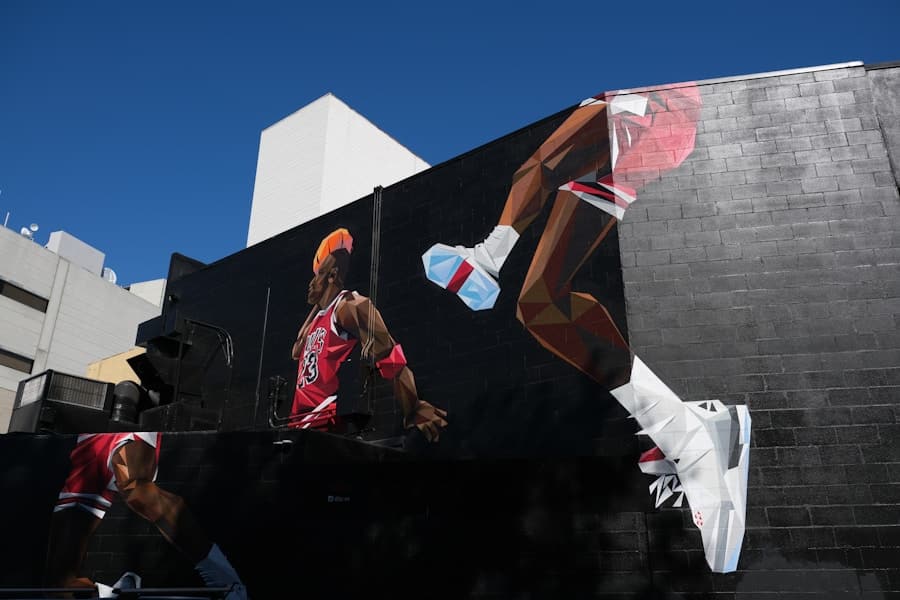The concept of the metaverse has rapidly evolved from a niche idea in science fiction to a tangible reality that is reshaping various industries, including sports. The metaverse is often described as a collective virtual space where users can interact with a computer-generated environment and other users in real-time. This immersive digital universe is characterized by its ability to blend augmented reality (AR), virtual reality (VR), and the internet, creating a seamless experience that transcends physical boundaries.
As sports organizations and fans alike begin to explore this new frontier, the potential for innovative engagement and revenue generation becomes increasingly apparent. Sports events have always been about more than just the game; they are social gatherings that foster community and shared experiences. The metaverse offers a unique platform for enhancing these interactions, allowing fans to participate in ways that were previously unimaginable.
From virtual stadiums that can accommodate thousands of fans to interactive experiences that allow for real-time engagement with athletes, the metaverse is poised to revolutionize how sports events are experienced. This transformation not only enhances fan engagement but also opens up new avenues for monetization and sponsorship opportunities, making it an exciting time for both sports organizations and their audiences.
Key Takeaways
- The metaverse is a virtual reality space where users can interact with a computer-generated environment and other users, and it is increasingly being used for sports events.
- Virtual reality technology is being used to enhance the fan experience at sports events in the metaverse, allowing fans to feel like they are part of the action.
- Interactive fan experiences in the metaverse are being created through features such as virtual meet-and-greets with athletes and interactive games and challenges.
- The metaverse is seeing a rise in virtual sports betting, allowing fans to place bets on virtual sports events and competitions.
- NFTs and collectibles are becoming popular in the metaverse sports world, allowing fans to own and trade digital assets related to their favorite teams and athletes.
Virtual Reality Technology in Sports Events
Virtual reality technology has emerged as a cornerstone of the metaverse, providing immersive experiences that can transport fans into the heart of the action. By donning VR headsets, users can find themselves in a virtual stadium, watching their favorite teams compete as if they were physically present. This technology allows for a level of immersion that traditional broadcasts simply cannot match.
For instance, companies like Oculus and HTC Vive have developed VR platforms that enable fans to experience live games from multiple angles, offering a 360-degree view of the action. This capability not only enhances the viewing experience but also allows fans to feel more connected to the event. Moreover, VR technology is being utilized for training and development within sports organizations.
Athletes can engage in simulated environments that replicate real-game scenarios, allowing them to practice their skills without the physical toll of traditional training methods. For example, the NBA has experimented with VR training programs that help players improve their shooting techniques by providing instant feedback in a controlled environment. This dual application of VR—enhancing fan experiences while also benefiting athletes—illustrates the multifaceted impact of this technology on the sports industry.
Creating Interactive Fan Experiences in the Metaverse

The metaverse presents an unprecedented opportunity for sports organizations to create interactive fan experiences that go beyond passive consumption. In this digital landscape, fans can engage with their favorite teams and athletes in ways that foster a sense of community and belonging. For instance, virtual meet-and-greet events allow fans to interact with players in real-time, asking questions and receiving personalized responses.
This level of engagement can deepen fan loyalty and create lasting connections between athletes and their supporters. Additionally, gamification elements can be integrated into these experiences, encouraging fans to participate actively rather than merely observing. For example, sports franchises can develop virtual challenges or competitions where fans earn rewards for completing specific tasks or achieving milestones within the metaverse.
These activities not only enhance the overall experience but also provide valuable data on fan preferences and behaviors, enabling organizations to tailor their offerings more effectively. By leveraging the interactive capabilities of the metaverse, sports events can transform into dynamic experiences that resonate with audiences on a deeper level.
The Rise of Virtual Sports Betting in the Metaverse
As the metaverse continues to grow, so too does the potential for virtual sports betting—a phenomenon that is gaining traction among tech-savvy fans. Virtual sports betting allows users to place wagers on simulated games or events within the metaverse, creating an engaging and interactive betting experience. This innovation is particularly appealing to younger audiences who are increasingly comfortable with digital transactions and online gaming environments.
Platforms like Decentraland and The Sandbox are already exploring ways to integrate betting functionalities into their ecosystems, allowing users to bet on virtual matches or competitions. The rise of virtual sports betting also raises important considerations regarding regulation and responsible gaming practices. As this sector expands, it will be crucial for stakeholders to establish guidelines that protect consumers while fostering a safe betting environment.
Collaborations between gaming companies and sports organizations can help create transparent systems that ensure fair play and responsible gambling practices. By addressing these challenges proactively, the metaverse can become a thriving hub for virtual sports betting that enhances fan engagement while prioritizing user safety.
NFTs and Collectibles in the Metaverse Sports World
Non-fungible tokens (NFTs) have emerged as a revolutionary force within the metaverse, particularly in the realm of sports collectibles. These unique digital assets allow fans to own a piece of their favorite teams or athletes in a way that was previously impossible. For instance, NBA Top Shot has gained immense popularity by allowing fans to purchase officially licensed highlights as NFTs, creating a new market for digital memorabilia.
Each NFT is verifiably unique and cannot be replicated, giving collectors a sense of ownership and exclusivity. The integration of NFTs into the sports world extends beyond mere collectibles; they can also serve as gateways to exclusive experiences. For example, owning a specific NFT might grant fans access to virtual meet-and-greets with players or exclusive content related to their favorite teams.
This creates a new layer of engagement that enhances the value of these digital assets while fostering community among collectors. As more sports organizations explore the potential of NFTs, we can expect to see innovative applications that further blur the lines between physical and digital fandom.
Virtual Athletes and Teams in the Metaverse

The Rise of Virtual Athletes in the Metaverse
The concept of virtual athletes and teams in the metaverse marks a significant shift in how we perceive and engage with competition and fandom. By leveraging advanced AI algorithms and motion capture technology, these digital entities can participate in virtual leagues or tournaments, pushing the boundaries of Competitive Gaming
Platforms like eSports have already paved the way for competitive gaming, where virtual teams battle it out in various video game formats. The metaverse takes this concept further by creating fully immersive environments where these virtual athletes can interact with fans and each other.
Virtual Athletes as Storytelling Tools
Moreover, virtual athletes can be designed to embody specific traits or characteristics that resonate with audiences, creating unique personas that fans can rally behind. This opens up new avenues for storytelling within sports, as these digital characters can have their own narratives, rivalries, and achievements.
The Future of Virtual Leagues and Sponsorships
As technology continues to advance, we may see entire leagues dedicated to virtual athletes, complete with sponsorship deals and fan engagement strategies tailored specifically for these digital competitors.
Challenges and Opportunities for Sports Events in the Metaverse
While the metaverse presents exciting opportunities for sports events, it also poses significant challenges that must be addressed for successful implementation. One major concern is ensuring equitable access to technology among fans. Not all individuals have access to high-quality VR equipment or stable internet connections necessary for fully engaging with metaverse experiences.
Sports organizations must consider how to bridge this digital divide to ensure inclusivity within their fan base. Additionally, there are concerns regarding data privacy and security within the metaverse. As fans engage with various platforms and share personal information, protecting this data becomes paramount.
Sports organizations must work closely with technology providers to establish robust security measures that safeguard user information while fostering trust among their audiences. By addressing these challenges head-on, stakeholders can create a more sustainable ecosystem within the metaverse that benefits both fans and organizations alike.
The Future of Sports Events in the Metaverse
Looking ahead, the future of sports events in the metaverse appears bright yet complex. As technology continues to evolve, we can expect even more innovative applications that enhance fan engagement and redefine how we experience sports. The integration of AI-driven analytics could provide real-time insights during games, allowing fans to access personalized statistics or commentary tailored to their preferences.
Furthermore, as more sports organizations embrace digital transformation, collaborations between traditional leagues and tech companies will likely become commonplace. These partnerships could lead to groundbreaking initiatives that push the boundaries of what is possible within the metaverse. From augmented reality enhancements during live broadcasts to fully immersive virtual stadiums where fans can gather regardless of geographical constraints, the possibilities are endless.
In conclusion, while challenges remain on this journey into the metaverse, the potential for transformative change within sports events is undeniable. As stakeholders navigate this evolving landscape, they will need to prioritize innovation while ensuring inclusivity and security for all participants. The metaverse is not just a trend; it represents a fundamental shift in how we engage with sports—one that promises to enrich our experiences as fans and redefine our relationships with athletes and teams in ways we are only beginning to understand.
Sports events in the metaverse are just one example of how technology is changing the way we experience entertainment. Another area where technology is making a big impact is in affiliate marketing. For those looking to get started in this lucrative field, this article provides valuable tips and strategies for success. Additionally, as more businesses move online, having a reliable website is crucial. Check out .
FAQs
What is the metaverse?
The metaverse is a collective virtual shared space, created by the convergence of virtually enhanced physical reality and physically persistent virtual reality.
How are sports events becoming fully immersive in the metaverse?
Sports events are becoming fully immersive in the metaverse through the use of virtual reality (VR) and augmented reality (AR) technologies, allowing fans to experience the event as if they were physically present.
What are some examples of sports events in the metaverse?
Examples of sports events in the metaverse include virtual reality broadcasts of live games, interactive fan experiences in virtual stadiums, and virtual meet-and-greets with athletes.
What are the benefits of sports events in the metaverse?
The benefits of sports events in the metaverse include increased accessibility for fans, new revenue streams for sports organizations, and the ability to create unique and interactive fan experiences.
What are some challenges of sports events in the metaverse?
Challenges of sports events in the metaverse include the need for reliable and high-speed internet connections, potential privacy and security concerns, and the integration of virtual experiences with traditional live events.

